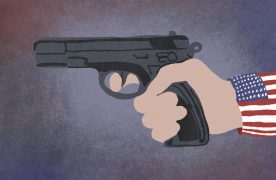While praising the work of former BU President Jon Westling, many Boston University administrators said they wondered how long he had been considering resigning before his announcement on Tuesday.
Executive Vice President Joseph Mercurio, who said he wasn’t surprised by the decision, said he and Westling had previously discussed his possible resignation, adding they had “a couple conversations.”
“He’s been assessing where he wants to be,” Mercurio said. “I think it was a highly personal decision on his part.”
The Chairman of the BU Board of Trustees, Richard B. DeWolfe, said he thought Westling might have known he would resign when he agreed to deliver the commencement address at BU’s graduation in May.
“I think that could be true,” DeWolfe said. “He never told me that, but I think that was why he did it.”
The naming of Westling as commencement speaker confused and angered many graduating seniors and even sparked an online petition in the days leading up to graduation.
But Mercurio said Westling not only enjoyed being president of the University, but he was also “extraordinarily effective.” He said Westling would leave “a number of quantifiable legacies” at BU, including the Medical Campus BioSquare project, the renovation of the infrastructure at the medical campus, and the recruitment of professors.
Mercurio also said Westling would be remembered for strengthening the University’s finances.
“He’s had an accumulation of budget surpluses every year of his presidency and the giving to the University has increased each and every year — his fundraising has been especially effective,” Mercurio said.
Mercurio added that Westling was a courageous leader in times of crisis for the University.
“I think one of the legacies is that he brought a style and a demeanor of leadership that was sort of a common influence,” Mercurio said. “For example, during the September 11 attacks on the United States, he was cool, calm, and had the University united and the senior staff present to deal with any contingencies.”
College of Communication Dean Brent Baker also said Westling helped ease the pain of the terrorist attacks for University students.
“I think his personality was one of quiet reassurance,” Baker said. “That voice was particularly good after 9-11 last year when he sent an e-mail out to the whole University.”
David K. Campbell, the Dean of the College of Engineering, said Westling would be remembered for helping the University through a transitional period.
“He has invigorated and expanded the Board of Trustees and he has begun an enormously ambitious program of renewing the BU infrastructure,” Campbell said. “He’ll be credited, as he rightly should, with the completion of the first part of the Student Village.”
Campbell said he thought Silber’s return as University president was done more as a matter of responsibility than an actual desire to return to his old position.
“My sense is Dr. Silber will step back in a sense of duty more than anything else,” Campbell said. “One of the things Westling said is he didn’t want to be a lame duck, so he resigned immediately. That was only possible because Dr. Silber was available.”
Baker said he didn’t believe the transition between Westling and Silber would disrupt the University at all.
“John Silber led the University for over 25 years and Jon Westling took over in 1996 and they pretty much, policy-wise, from my viewpoint, agreed on almost everything,” Baker said. “I can’t see any kind of a change.”
Mercurio called Silber “the logical man to step in temporarily” based on the fact that Silber was the president from 1971 to 1996.
“I think virtually everyone on the senior administration has worked with John Silber in one capacity or another,” Mercurio said. “I think it’ll be a smooth transitional period that we will go through.”
This is an account occasionally used by the Daily Free Press editors to post archived posts from previous iterations of the site or otherwise for special circumstance publications. See authorship info on the byline at the top of the page.












